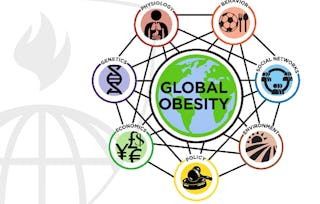In this course, we’ll look at the facts and misconceptions around obesity and discuss key physiological and psychological concepts around the brain’s control of appetite and body weight. We’ll consider the biological and environmental pressures that make it easy to gain weight (and hard to lose it!). Most importantly, we'll give you the opportunity to reflect on your own knowledge and assumptions around the subject.

Understanding Obesity

889 reviews
Skills you'll gain
Details to know

Add to your LinkedIn profile
See how employees at top companies are mastering in-demand skills

There are 4 modules in this course
This week we'll discuss what we know about diet, appetite and obesity. But, and perhaps more importantly, we'll point out the gaps in our knowledge.
What's included
4 videos3 readings1 assignment
This week we discuss some aspects of the physiology of obesity and learn how so-called "food addiction", stress and early-life experience can affect our eating choices. Included is an optional assignment where you can explore barriers to healthy eating. This assignment is not graded but does use the same interface as the Week 4 assessment. As such, you may find it useful to use it as practice for the "real thing".
What's included
2 videos3 readings1 assignment1 peer review
This week we discuss some aspects of the psychology of appetite control and learn how portion sizes and food insecurity might affect our behaviours.
What's included
2 videos2 readings1 assignment
This week online material will be posted ad hoc as we consolidate and discuss what we've already learned. This week's main tasks are a quiz on the scientific method and the peer-reviewed assignment. Please note you can attempt the Week 4 quiz only once.
What's included
1 reading1 assignment1 peer review
Instructor

Offered by
Explore more from Nutrition
 Status: Free Trial
Status: Free TrialNational Academy of Sports Medicine
 Status: Preview
Status: PreviewJohns Hopkins University
 Status: Preview
Status: PreviewEmory University
 Status: Free Trial
Status: Free Trial
Why people choose Coursera for their career

Felipe M.

Jennifer J.

Larry W.

Chaitanya A.
Learner reviews
- 5 stars
74.24%
- 4 stars
19.23%
- 3 stars
4.83%
- 2 stars
0.33%
- 1 star
1.34%
Showing 3 of 889
Reviewed on Mar 11, 2024
Great course, well presented with some thought provoking subjects. Recommended for anyone interested in Nutrition
Reviewed on Jan 9, 2018
Great experienceThis was great experience, with thouthful insight’s. Looking forward for STEP 2 - Episode 2, “UNDERSTANDING OBESITY_Univ Edinburgh”…
Reviewed on Mar 14, 2023
The course material and the videos were good and well organized. the interactiveness of the video could be more engaging. some animations, intro, highlights, and conclution could be great

Open new doors with Coursera Plus
Unlimited access to 10,000+ world-class courses, hands-on projects, and job-ready certificate programs - all included in your subscription
Advance your career with an online degree
Earn a degree from world-class universities - 100% online
Join over 3,400 global companies that choose Coursera for Business
Upskill your employees to excel in the digital economy
Frequently asked questions
To access the course materials, assignments and to earn a Certificate, you will need to purchase the Certificate experience when you enroll in a course. You can try a Free Trial instead, or apply for Financial Aid. The course may offer 'Full Course, No Certificate' instead. This option lets you see all course materials, submit required assessments, and get a final grade. This also means that you will not be able to purchase a Certificate experience.
When you purchase a Certificate you get access to all course materials, including graded assignments. Upon completing the course, your electronic Certificate will be added to your Accomplishments page - from there, you can print your Certificate or add it to your LinkedIn profile.
Yes. In select learning programs, you can apply for financial aid or a scholarship if you can’t afford the enrollment fee. If fin aid or scholarship is available for your learning program selection, you’ll find a link to apply on the description page.
More questions
Financial aid available,
¹ Some assignments in this course are AI-graded. For these assignments, your data will be used in accordance with Coursera's Privacy Notice.

